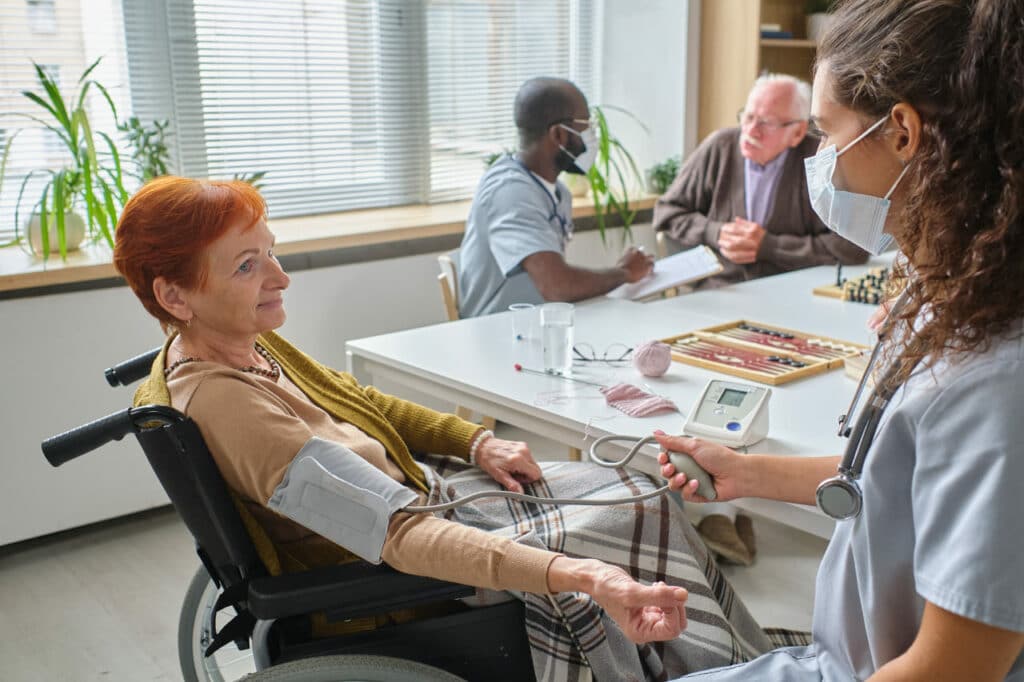As compassionate human beings, it is our solemn responsibility to provide unwavering care and support for our aging loved ones. Nevertheless, the grim reality remains that nursing homes frequently fall short of expected standards in their provision of care resulting in appallingly elevated incidents of elder abuse.

We must muster the courage to confront this pervasive issue head-on by instituting urgent measures aimed at enhancing care delivery within these facilities. We owe nothing less than exemplary treatment to one of society’s most delicate demographics. Elderly individuals deserve respect, love, and dignified living conditions in their golden years after a lifetime of hard work.
Defining Elder Abuse in Nursing Homes
Elder abuse in nursing homes is a profoundly complex and pervasive problem that involves numerous destructive actions, both intentional and unintentional. The issue encompasses a wide range of harmful behaviors including physical abuse, sexual abuse, psychological abuse, economic exploitation and neglect. Moreover, the situation is further complicated by its intricate nature involving both the characteristics of the abused as well as those of their abusers.
At its core lies an egregious violation of an elderly individual’s fundamental human rights that strips them off the dignity and respect they have earned throughout their lives- particularly in old age when they require care most.
Warning Signs of Elder Abuse in Nursing Homes
There are a number of red flags that may indicate elder abuse in nursing homes or institutions. Signs of elderly abuse can be physical injuries, personality changes, weight loss, poor hygiene or living conditions, isolation from loved ones, and unexplained financial losses. These can be hard spot, particularly for those who are not familiar with the day-to-day life of nursing homes. This is why it’s important for family and loved ones to keep a watchful eye over their elderly relatives who reside in nursing homes.
Reporting Elder Abuse in Nursing Homes
Taking prompt action and reporting suspected cases of elder abuse in nursing homes or institutions is not just necessary, it is imperative. One effective course of action that can be taken is to immediately report the suspicion of abuse to the appropriate authorities such as Adult Protective Services or local law enforcement agencies without any delay.
It should always be kept in mind that detecting instances of elder abuse often becomes challenging due to victims’ reluctance and fear associated with negative outcomes including lack of resources. In fact, there have been numerous incidents where abused elders may even resort to telling lies solely for protecting their abusive caregivers from facing legal actions or avoid being placed within a nursing home facility themselves.
Preventing Elder Abuse in Nursing Homes
To prevent elder abuse in nursing homes, it is crucial to boldly address the underlying causes of such maltreatment. Institutional authorities must take proactive and decisive measures that promote a safe, secure, and all-inclusive environment for seniors.
These measures should include offering extensive training programs to staff on identifying and preventing elder abuse effectively. Additionally, they need to establish clear reporting procedures prioritizing minimizing harm while considering victims’ well-being.
Furthermore, regular check-ins with residents and staff can foster an open communication channel where cases of misconduct are reported timely. It would help create an environment that fosters transparency through accountability by establishing guidelines for every resident’s care plan. It is essential always to emphasize the importance of respecting older adults’ dignity and independence at any given time throughout their stay within a nursing home facility.
Conclusion
Elder abuse within nursing homes is an egregious violation of human rights that cannot and should not be tolerated under any circumstances. It demands immediate action from all members of society, including caregivers, family members, policymakers, and law enforcement officials.
It is incumbent upon us as a community to prioritize comprehensive training on how best to identify and prevent elder abuse. This training must be available for every caregiver who works with seniors in nursing homes or other residential facilities.
We also need greater transparency through accountability measures that ensure every resident’s care plan.This includes specific safeguards against potential abuses such as neglect or financial exploitation.
Reporting procedures should likewise be established promptly so victims receive prompt intervention while respecting their well-being throughout the process. By taking bold steps towards safeguarding vulnerable communities in nursing homes and other residential facilities, we can create a society that values the dignity and independence of older adults.






